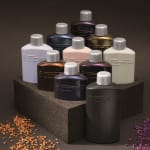
At K 2019 Karl Finke GmbH & Co. KG from Wuppertal, Germany, focuses on sustainability. Core topics will be innovative solutions for coloring PCR polyolefins and bio-polymers as well as laser marking as a sustainable alternative to printed labels.
A new process developed at Finke enables the use of recyclate regardless of color or fluctuations in material quality. Using a special coextrusion routine, virgin material and recyclate are processed separately and form different layers of the product. The outer layer is made entirely of new material. This allows for an economic use of colorant, as the colorant does not have to cover or mask the color of the recycled material. The use of virgin material in the outer layer opens up the scope of design to all possibilities offered by Finke’s FIBAPLAST, FIBAFEKT or FIBACOMP masterbatches. Finke is going to showcase numerous bright colors and many pastel shades, which can both be equipped with effects ,such as metallic look, pearlescent or glitter. On a dark background, a masterbatch with interference color from the FIBAPLAST series can be used for the outer layer. Various pastel shades, which impart a vintage look, can be achieved with highly filled compounds from the FIBAFEKT range. Even with a high pigment load in the compound, streak-free coloring is possible. The FIBAFEKT series also enables the creation of lacquer-like structures and surfaces using the coextrusion process.

Colorants for bio-plastics have to fulfil special requirements. Masterbatch and colorant formulations have to take into account the bio-plastics’ special properties and their processability. Attention must also be paid to the properties of each of the recipe’s components which have to be biodegradable or derived from renewable resources as well, depending on the specification of the final product. At K 2019 Finke is going to present its range of FIBAPLAST masterbatches for coloring bio-plastics. The FIBAPLAST biomasterbatch developed at Finke is biodegradable according to EN 13432. All components of the recipe, from pigments and colorants to fillers and additives, have been assessed, tested and approved for this application.
Furthermore, Finke has expanded its comprehensive masterbatch program for colored laser markings. Additive batches for the functional modification of existing color concentrates as well as FIBAPLAST combination batches which offer both color and function are now available for PP, PE, PET, PC, ABS, PLA, PA6, and PA12. The laser technology enables direct marking and decoration of plastics packagings. The manufacturer can therefore dispense with additional labels and the packaging is classified as singlematerial packaging for easier recycling. The additive and masterbatch technology used for color laser marking has been developed at Finke’s laboratory in Wuppertal. Many years of experience and a Nd:YAG laser at Finke's technical center ensure that all products are tailored to application within the shortest possibletime, so customers can quickly bring their ideas to market.



